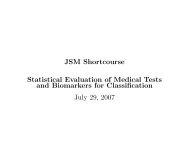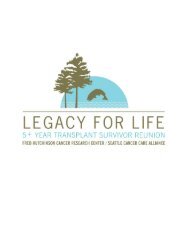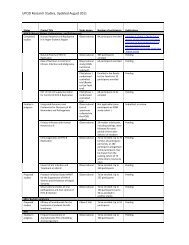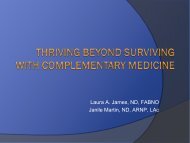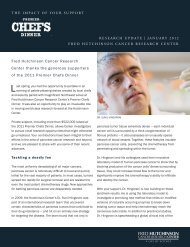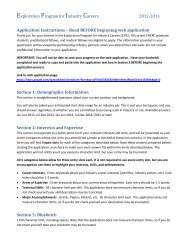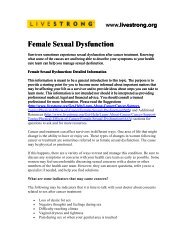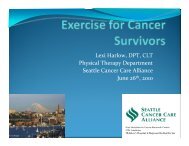Summer Undergraduate Research Program - Fred Hutchinson ...
Summer Undergraduate Research Program - Fred Hutchinson ...
Summer Undergraduate Research Program - Fred Hutchinson ...
Create successful ePaper yourself
Turn your PDF publications into a flip-book with our unique Google optimized e-Paper software.
Extra Personal Statement #7<br />
My current PI insists that science is like boxing: if you get knocked down, you<br />
get up and fight again. To me, this is an inspiring but simple comparison. If we<br />
are picking sports, I say that science is like swimming. I swam for over a<br />
decade, and for my race of fifty seconds I trained five hours per day, five<br />
hundred hours per season. Through hard work I qualified for and competed at<br />
the NCAA Division I Championships and Olympic Trials. I learned that<br />
dedication, perseverance, and mental endurance are necessary to get results.<br />
Thus far, these lessons have translated well to research.<br />
As an undergraduate, I conducted honors thesis research in St. Olaf's<br />
Department of Neurobiology and Physiology, in Dr. Anne Freeburn's<br />
laboratory with the guidance of my adviser, Dr. Juan Garcia. My project<br />
constituted early steps in the elucidation of the cellular mechanism of<br />
menopausal hot flashes. Building on Dr. Garcia's work, I developed a mouse<br />
model and system of measurement for studying hot flashes. Using these<br />
animals, I identified colocalization in the estrogen receptor alpha and TREK-1<br />
in the medial preoptic area of the mouse brain, a region involved in<br />
thermoregulation. TREK-1, a two pore domain potassium ion channel, is<br />
involved in temperature sensing and plays a role in neuronal stability. This<br />
identifies a potential role for estrogen action in thermoregulation and therefore a<br />
potential mechanism for dysregulation of heat sensing (hot flashes) in the<br />
estrogen-deficient state of menopause. The ultimate goal is to characterize the<br />
mechanism underlying hot flashes so that safe and effective therapies can treat<br />
these symptoms.<br />
This experience opened my eyes to biomedical research. I was excited to find in<br />
my fellow lab members a work ethic I had previously seen only in my<br />
teammates in swimming. I also enjoyed the logical yet creative process of<br />
working through problems both broad and narrow in scope. I was introduced<br />
to the day-to-day challenges of working in science; for example, my mice<br />
became increasingly adept at removing their temperature-sensing tail cuffs, so I<br />
had to stay ahead of their learning curve with new methods of attachment.<br />
Additionally, I liked that the ultimate aim of research is to further medical<br />
knowledge and capability, improving people’s health and wellbeing. Overall, I<br />
found research to be engaging, challenging, and rewarding, and I decided to<br />
pursue additional experience and training after completing my undergraduate<br />
degree.<br />
Since September of 2006 I have worked as a technician at the Drexel School of<br />
Medicine. I joined Dr. Jarvis Hans' laboratory when he brought his lab to<br />
Philadelphia from Baylor College of Medicine. Our lab investigates the role of<br />
estrogens and androgens in metabolism, diabetes and obesity. As the tech I have<br />
132




